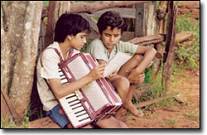|
|
||||
|
|
by Donald Levit  With six million tickets sold, Breno Silveira’s Two Sons of Francisco/2 Filhos de Francisco -- A História de Zezé Di Camargo & Luciano is Brazil’s top grosser of the last two decades and, along with DVD and CD soundtrack release, is already touted for a TV mini-soap composed of material edited out. “Based on a true story,” as rendered by two first-time scriptwriters with “collaboration” from former publicity director Silveira and veteran Domingos de Oliveira, this film is really two movies, a Horatio Alger story in poor landlocked Goiás state, and a shorter repeat performance in the big-time big city. The former, roughly two-thirds of the two-hour runtime, features handsomely likeable if simple and predictable characters, some broad humor, a seeming villain who learns a lesson and reveals a good soul, and ends in tragedy. The film should have wrapped here. Instead, in a replay of the first part but lacking its rustic charm, the story follows on to the immense success of ho-hum biopics. Though the standard sex and substance abuse are absent, the photography sags and the heart, the plain infectious music, declines into the pop pap of the mass industry, finishing off in a family-reunion concert performance by the stage-smiling real-life subjects. That music, sertaneja/caipira (country/small farmer-redneck), may be thought of as a country & western popular and profitable for decades now in its homeland, with a tendency towards tacky cliché, and a needless embarrassment to some Brazilians who consider themselves culturally sophisticated. Viewers of a light undemanding sentimental bent should find the first hour or so rewarding enough; it's inoffensive family fare. For, indeed, music and family/family values, and dreams, are what this is about, as all his married life with Helena Siqueira (Dira Paes), poor farmer Francisco José de Camargo (Ângelo Antônio) steps to the music which he hears. That rhythm, those dreams, cannot pay rent to disapproving father-in-law Benedito (Lima Duarte) for the land and basic adobe house soon crawling with the seven children. When Uncomplaining Appreciation for the brothers’ musical accomplishments, and box-office abroad, will depend on reaction to this kind of harmony, as they are spotted by countrified flashy impresario of such duos (duplas caipiras) Miranda (José Dumont), who takes them out on the road for a week that turns into four months with no letters home. Worried irate The music ends, and the movie should, too. But under various stage names eventually settling on Zezé Di Camargo, Mirosmar (now Márcio Kieling) drifts back into soupy local rock-country gigs, marries the story’s second sacrificing woman, Zilu (Paloma Duarte), and moves with her and two daughters to São Paulo. Disheartened by the business’ apparently worldwide fickle corruption, he wants to give up despite his wife’s encouragement, until younger brother Welson (Thiago Mendonça) shows up unannounced. The latter cannot play the guitar, but some quick lessons and shrewd legwork by now construction worker Francisco lead to a number one hit record. As they say, the rest is history. Zezé Di Camargo and Luciano (Welson’s stage name) are today virtually an industry unto themselves, the one-in-a-million shot that miraculously worked out. The only alternative, their father had insisted from the beginning, was for the boys to be janitors. (Released by Columbia TriStar; not rated by MPAA.) |
||
|
© 2024 - ReelTalk Movie Reviews Website designed by Dot Pitch Studios, LLC |



